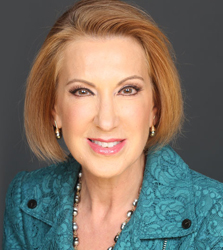
Debate Qualifying Standards A Problem for Some Republicans
One month from today, ten Republican candidates for President will walk out onto the stage in Cleveland, Ohio for a debate. Left off of that stage will likely be six additional candidates. And that's causing problems for some, according to Bloomberg Politics:
The Republican Debate Selection Process Is a New Wild Card in Presidential Politics
A month from now, 10 Republican presidential candidates will walk out onto a primetime debate stage in Cleveland and confront each other face to face for the first time. If the debate were held today, Donald Trump would be one of them. Two sitting governors, a U.S. senator, the runner-up for the 2012 GOP nomination, and the first female CEO of a Fortune 50 company would all be excluded.
That's an estimate based on qualifying criteria described by Fox News, which will host the GOP showdown in partnership with Facebook on Aug. 6 in Cleveland, using an average of five as-yet-unspecified national polls to determine the lineup...
In an unprecedentedly large field of 16 presidential contenders, at least half are statistically on the bubble of not qualifying for the debate stage, with only a month to differentiate themselves. The result is a campaign-within-a-campaign, with very different imperatives from the ones the primary process is designed to produce. Campaigns who are in danger of not making the cut may try everything possible to improve their chances over the next four weeks—taking extreme, news-making positions; dumping opposition research on opponents; inundating e-mail inboxes; and blitzing the Sunday television circuit, late-night talk shows, conservative radio airwaves, and cable news programs. Instead of spending resources on political operations in early-voting states, candidates may blow that cash on national TV ads to boost name recognition at the eleventh hour...
CNN, which will be hosting the second GOP debate in September, has similar criteria to winnow the debate participants to the top ten candidates.
But the problem is that while it's fairly easy to identify the top six or seven candidates in the race, it can be very difficult to separate the top of the bottom tier from the middle or bottom of the pile:
“A microscope has not yet been invented that enables us to determine the difference between the 10th-place person and the 11th-place person,” said Ken Goldstein, a professor of politics at the University of San Francisco and a polling analyst for Bloomberg Politics. “That difference, literally, will be less than half of a percentage point. And maybe even less than that.”
...Limiting the stage to 10 candidates doesn't reflect a natural cutoff point in the current Republican field. As it currently stands, there's probably a top tier of five or six candidates; from there, ranking the field gets far more difficult. “There's no difference between [Ohio Governor] John Kasich and Bobby Jindal except one's going to be in and one is going to be out,” said Doug Usher of Purple Strategies, which conducts polling for Bloomberg Politics. “Or maybe they're both going to be out.”
In addition, the criteria don't reflect how the bottom tier must necessarily campaign, using their scarce (usually) resources to build name recognition and support in the early states of Iowa, New Hampshire, South Carolina, and Nevada:
“People have lumpy strategies in different states,” says Sasha Issenberg, a Bloomberg Politics contributor and author of The Victory Lab: The Secret Science of Winning Campaigns. “Their election strategies are predicated on not having their support evenly distributed. You look at Chris Christie and John Kasich banking on doing well in New Hampshire. You have Rand Paul banking on doing well in Nevada.”
A quick look at the polling data at RealClearPolitics.com demonstrates the problem. Former Hewlett-Packard CEO Carly Fiorina currently ranks 12th nationally according to the poll average. But in New Hampshire, she comes in eighth currently - not exactly leading the pack, but definitely someone who is receiving some serious attention as a candidate. Other candidates who fare poorly in national polls at the moment but who are doing respectably well in the early states according to RealClearPolitics.com includes former Pennsylvania Governor Rick Santorum (ninth in Iowa) and South Carolina Senator Lindsey Graham (third in his home state). New Jersey Governor Chris Christie is right on the bubble at the moment, at tenth place in the national polls, but is in fifth place in New Hampshire.
Who makes it onto the stage in Cleveland will likely make a difference for some candidates, and it may cause the GOP to re-evaluate how the debate process is set up in future election cycles. But as things stand now it looks like several impressive candidates will likely be relegated to the sidelines based on the current criteria for inclusion.



